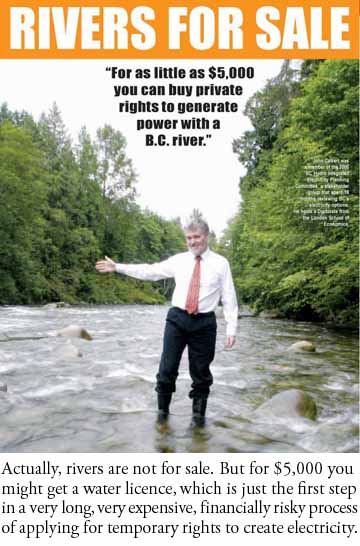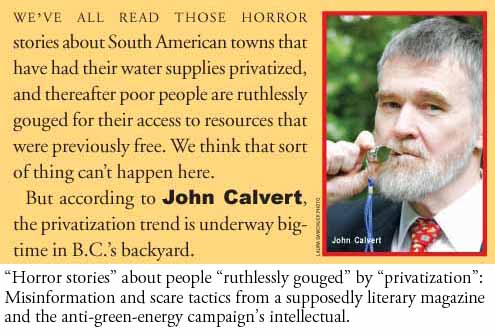

John Calvert is an SFU political scientist who wrote a 2007 book called Liquid Gold: Energy Privatization in British Columbia. Although it’s probably the most detailed argument in the campaign against independently produced clean electricity, the book’s basic message will be familiar to anyone who’s been following the issue. Liquid Gold’s key points are summed up in an interview with Calvert in the Lookout section of BC BookWorld’s autumn 2008 edition. You can download the article here and read our response below.
The magazine precedes Calvert’s interview with an especially ridiculous version of the privatization myth:

Once the interview starts rolling, Calvert quickly runs through the stereotypical and discredited myths of “privatization,” “windfall profits” and “outrageous hydro rates.” But his arguments fall flat.
He makes some apples-and-oranges comparisons. Calvert compares B.C.’s policy of allowing independents to develop new electricity sources (a common practice worldwide) with electricity deregulation in some U.S. states. That’s not a valid comparison at all.
Calvert’s argument about costs repeats the skyrocketing rates myth. He compares the cost of electricity from infrastructure that was built and paid for decades ago with the cost of electricity from newly developed sources. Then he exaggerates the latter cost with repeated allegations that future rate increases will be dramatic.
Calvert argues that two-tier rates help lower-income people, then complains that B.C. doesn’t have a two-tier system. We do. The new two-tier rate was announced long before this interview was published.
Calvert repeats the myth that independents pay little to the public. He suggests independents pay the public only $5,000 to $10,000 for a water licence and only about three per cent of the value of the water resource. In fact independents pay over a third of their revenue back to the public in taxes and fees. On top of that they’re responsible for their own upgrades and maintenance. Calvert doesn’t even mention the cost of developing the projects. Nor does he mention how independents shield BC Hydro — and therefore consumers — from the expense of all those projects that don’t work out after years of study and investment.
One of Calvert’s favourite arguments is so odd that it’s rarely if ever used by his allies. He claims that an electricity purchase agreement between BC Hydro and an independent company amounts to consumers providing collateral for independents to get bank loans. He doesn’t explain what the consumers’ collateral is and how a bank would confiscate it from consumers if a company defaulted on a loan. But Calvert really likes this argument. He repeats it a lot.
Calvert complains that when the BC Hydro purchase agreement ends, consumers don’t own the assets. But the people of B.C. will certainly continue to own the rivers and streams, as we have all along. As for the infrastructure that the independents built, Calvert doesn’t acknowledge that the companies paid for it. Nevertheless when the water licence ends after a maximum of 40 years, the province has the right to take over the infrastructure. Furthermore BC Hydro now wants future rights to buy out the projects.
Calvert repeats the environmental devastation myth, greatly exaggerating the footprint left by clean energy projects. In fact clean energy proposals go through years of studies and reviews before development can even begin. Then, if the proposals are approved, they face stringent environmental standards at every stage. Calvert’s environmental argument can just as easily be applied to almost any human endeavour — including publishing a book like Liquid Gold or a magazine like BC BookWorld.
Calvert argues that B.C.’s pre-1983 infrastructure is sufficient for our current and future needs. In fact we’ve been a net importer of electricity for seven of the last eight years. Only in a year with exceptionally high water levels can B.C. produce enough electricity for its needs. Meanwhile our population keeps growing.
Calvert argues that we import electricity only when prices are low. But although B.C. can manipulate the import market to some extent, most of our imports result from our inability to produce enough electricity for ourselves. As prices in other regions rise and our population increases, it would be foolish to continue relying on imports.
Calvert claims that B.C. exports help reduce the amount of dirty power generated in Alberta and Washington state. But he ignores the fact that B.C. imports more than we export. So we’re increasing the output of dirty energy from Alberta and Washington. We import up to 15 per cent of our electricity because we can’t produce as much as we consume.
Calvert goes along with the interviewer’s suggestion that the issue of independently produced clean electricity has received little attention. In fact it has received an onslaught of negative attention from a very influential and well-financed campaign to preserve the status quo.
Calvert wraps up the interview by repeating the skyrocketing rates myth, he claims First Nations have no involvement in proposals and he quickly rehashes his allegations about privatization and give-aways.
Tired, discredited myths — these are the key points of Calvert’s book, Liquid Gold. That’s probably the strongest intellectual basis for the campaign against independently produced clean electricity.
And BC BookWorld? It concludes the article with a plug for the highly misleading Gee Whiz Map.